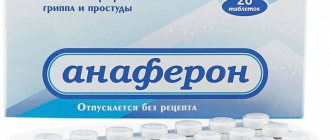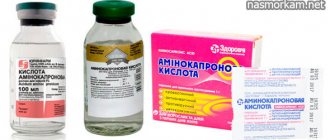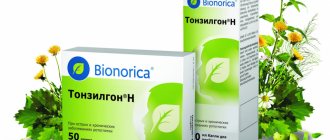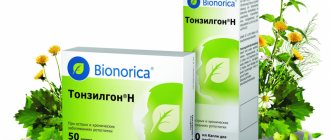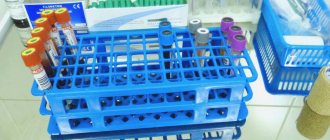Hyporamine as a means of preventing ARVI
AND
For herbal remedies for the prevention of acute respiratory viral infections, such drugs as Giporamine are recommended - a dry purified extract from the leaves of sea buckthorn of the buckthorn family of the Sucker family, produced by the production and experimental plant VILAR (approved by the Federal State Committee of the Ministry of Health of the Russian Federation in 1998).
Hyporamine has high antiviral activity against various strains of influenza A and B viruses, adenoviruses, paramyxoviruses, herpes simplex viruses, Varicella zoster shingles and varicella zoster virus, cytomegaloviruses, respiratory syncytial virus. Hyporamine has interferon-inducing properties and also has an inhibitory effect against gram-positive and gram-negative bacteria, tuberculous mycobacteria, and candida.
Mechanism of action
realized intracellularly.
The mechanism of action of Giporamin is based on the inhibitory effect on viral neuraminidase. This enzyme, which is part of influenza virions, hydrolyzes the glycosidic bond connecting the keto group of N-acetylneuraminic acid with sugars. As a result of suppression of viral neuraminidase, virion assembly is disrupted, and thus viral reproduction is disrupted. In addition, Giporamin induces the production of interferon in blood cells in in vitro
and increases the content of interferon in the blood of patients.
Currently, Giporamin is produced in the form of sublingual tablets for sanitation of the oral cavity, 0.02 g, 20 tablets per package. Clinical studies were carried out in all developed dosage forms (ointment, suppositories, lyophilized solution).
Clinical studies were conducted on 625 inpatients (adults and children) with various viral diseases.
In adults, Giporamin has undergone phase 2 clinical trials of tolerability and efficacy. The first phase of clinical trials of Giporamine was carried out at the Research Institute of Virology named after. DI. Ivanovsky RAMS and in the department for the study of reparative processes in the skin of the MMA named after I.M. Sechenov on 48 adult patients and showed good tolerability and sufficient effectiveness of the drug in all five dosage forms, which was confirmed by objective clinical and laboratory indicators.
The second phase of expanded clinical trials in 326 adult patients confirmed the phase 1 data on the good tolerability of Giporamine and revealed a wide range of its antiviral activity.
The effectiveness and tolerability of Giporamine in childhood were studied in 251 patients: with ARVI - 120 patients, with chickenpox - 37, with herpes virus - 69, papillomavirus and other viral dermatoses - 25 patients.
Data from clinical studies of Giporamin in adults
Treatment of ARVI. The studies were carried out at the Research Institute of Virology on 149 patients, among whom 84 patients had uncomplicated influenza and 65 patients with other acute respiratory viral infections complicated by a bacterial infection - sore throat. Hyporamine, when administered early on days 1–2 of illness, significantly reduced the duration of fever and symptoms of intoxication and led to an earlier disappearance of inflammatory changes in the tonsils.
Efficiency of treatment of infections caused by Herpes simplex, Varicella zoster, cytomegalovirus
. At the Research Institute of Transplantology and Artificial Organs, clinical trials were carried out on 112 patients with cardiac surgery and nephrology. Of these, 75 patients were prescribed Giporamin as a preventive measure for postoperative complications. For therapeutic purposes, 25 patients received Giporamin, including 20 patients with herpes simplex, 5 with herpes zoster. It has been established that Giporamin not only provides a persistent antiviral effect against the above groups of diseases, but also has a prophylactic effect to prevent postoperative viral complications, especially in conditions of immunosuppressive therapy.
At the Research Institute of Immunology, in the department of reparative processes in the skin, and at the Department of Skin and Venereal Diseases of the Moscow Medical Academy named after I.M. Sechenov clinical studies were conducted on 65 patients with viral lesions of the skin and mucous membranes (herpes simplex and recurrent, herpes zoster, cytomegalovirus infection). The use of Hyporamin contributed to faster drying of the vesicles and the formation of crusts, a decrease in the inflammatory reaction, and a decrease in pain and itching.
Data from clinical studies of Giporamin in children
Treatment of ARVI. The study was conducted in 42 children with acute respiratory viral infections (influenza, parainfluenza, adenoviral and respiratory syncytial infections, as well as mixed infections), including those occurring with obstructive syndrome and pneumonia. It was found that treatment with Giporamine contributed to a significant reduction in the duration of clinical manifestations, such as cough, rhinitis, fever, and wheezing in the lungs.
At the Department of Children's Infectious Diseases of the Russian State Medical University, Giporamin was prescribed to 78 children suffering from acute respiratory viral infections complicated by obstructive bronchitis. The use of Giporamin led to a significant reduction in the duration of the main clinical symptoms (fever, shortness of breath, hoarseness) and length of hospital stay (Fig. 1).
1. Rhinitis 2. Cough 3. Fever 4. Hoarseness 5. Wheezing in the lungs 6. Duration of viral antigen retention Fig. 1.
The rate of disappearance of clinical signs during monotherapy with Giporamine in patients with acute respiratory viral infections occurring with obstructive syndrome The effectiveness of treatment of chickenpox
. At the Department of Pediatric Infections of the Russian Medical Academy of Postgraduate Education, 37 children with chickenpox were treated with Giporamine. The data obtained indicate that when using Giporamine, compared with traditional therapy, there is a more rapid cessation of rashes and reverse development of vesicular elements, especially in cases where the drug is prescribed in the early stages of the disease (Fig. 2).
1 - cessation of rashes on days 1-3 of treatment;
2 — formation of crusts on days 3-5 of treatment Fig. 2. The effectiveness of treatment with monotherapy with Hyporamine in patients with chickenpox Treatment of herpes viral dermatoses
. At the Department of Skin Diseases, Faculty of Medicine, Russian State Medical University, Giporamin was used in 46 children with herpes viral dermatoses. The therapeutic effect manifested itself in the form of regression of rashes, absence of fresh manifestations, improvement in general condition and well-being compared to the control group receiving traditional drugs (bonafton tablets and ointment).
Studies have shown good tolerability of Hyporamine in all studied dosage forms: in both adult patients and children, no toxic manifestations of a general or local nature, including an allergic nature, were observed, and no abnormalities were identified according to clinical laboratory tests (blood, urine, liver tests, etc.).
Conclusion
The combination of Hypotrambin's antiviral, antibacterial, interferon-inducing effects with the absence of any side effects on the patient's body provides a wide range of its therapeutic effectiveness in the clinic and the possibility of use in both adult patients, including pregnant women, and children.
Hyporamine sublingual tablets are used in adults and children as a therapeutic and prophylactic agent for:
- influenza (A and B)
- parainfluenza
- respiratory syncytial, adenoviral and other ARVI
- tonsillitis and rhinitis occurring against the background of ARVI.
Hyporamine is prescribed as early as possible during the course of the disease. Giporamine tablets are used in adults and children over 3 years of age. Adults are prescribed 1 tablet 4-6 times a day, children over 12 years old - 1 tablet 3-4 times a day, children from 3 to 12 years old - 1/2 tablet 2-4 times a day. Hyporamine tablets are kept in the mouth until they are completely absorbed. The tablets provide sanitation of the oral cavity (suppression of viruses and pathogenic microflora). The duration of use depends on the severity of the process and is 3–5 days for mild forms of the disease. In severe forms of the disease, the course of treatment is 2–3 weeks. For individual prevention during an influenza epidemic, sublingual tablets of Giporamine are used: for adults, 1 tablet 2–4 times a day, for children over 12 years old, 1 tablet 2–3 times a day, for children from 3–12 years old, 1/2 tablet 1– 2 times a day depending on age.
In conditions of immunosuppressive therapy, in postoperative patients, in risk groups, it is advisable to use Giporamine in prophylactic doses to prevent the development of viral complications.
Compound
- Sublingual tablets - dry purified sea buckthorn leaf extract, cocoa powder, vanillin, refined sugar, sodium carboxymethylcellulose, calcium stearate.
- Hyporamine, lyophilized for solution preparation, is a sterile extract from the leaves of sea buckthorn.
- Hyporamine ointment - extract from sea buckthorn leaves, petroleum jelly, vinylin, nipagin, Tween-80, eucalyptus oil, medical emulsifier, sterile water
- Rectal suppositories - extract from sea buckthorn leaves, solid fat type A.
- Vaginal suppositories - extract from sea buckthorn leaves, vaseline oil, solid fat type A.
Pharmacodynamics and pharmacokinetics
Pharmacodynamics
A preparation based on an extract from sea buckthorn leaves. the drug are represented by a polyphenolic complex of galloellagitannins , which have an antiviral effect against various influenza viruses ( strains A and B ), paramyxoviruses , cytomegaloviruses , adenoviruses , herpes zoster viruses , respiratory syncytial virus . The mechanism of action of Giporamin is based on the inhibitory effect on viral neuraminidase .
The inhibitory effect of the drug on the process of viral reproduction is manifested at all stages of reproduction. The drug promotes the production of interferon in the blood of patients. Hyporamine has a moderate antimicrobial effect against bacteria, tuberculous mycobacteria, and some filamentous fungi. The drug is low-toxic and does not have mutagenic, allergenic, carcinogenic or teratogenic effects, and does not affect the patient’s immune status.
Pharmacokinetics
No data available.
Indications for use
The drug is prescribed to adults and children from 2 months for the prevention and treatment of adenovirus infection , influenza (strains A and B), respiratory syncytial infection and other acute respiratory infections , parainfluenza , zoster , all forms of herpes of genital and non-genital localization, tonsillitis due to acute Acute respiratory infections, viral respiratory diseases with rhinitis, cytomegalovirus infection and viral diseases caused by pathogens sensitive to the drug.
Hyporamine during pregnancy and lactation is taken in consultation with a doctor.
Analogs
Level 4 ATX code matches:
Paxlovid
Lagevrio
Veklury
Remdeform
Areplivir
Coronavirus
Avifavir
Triazavirin
Arpeflu
Yodantipyrine
Flavoside
Amizon
Altabor
Lavomax
Anaferon for children
Anaferon
Amiksin
Arbidol
Ferrovir
Tiloron
There are no structural analogues of the drug.
Drugs with similar therapeutic effects - Alpizarin , Arbidol , Amiksin , Ingavirin , Viracept , Kagocel , Yodantipirin , Nikavir , Lavomax , Ergoferon , Oxolin and others.
Hyporamin price, where to buy
The price of Giporamin tablets No. 20 varies from 130 to 169 rubles per pack. You can buy Giporamine in most pharmacies in Moscow and other cities.
- Online pharmacies in RussiaRussia
ZdravCity
- Hyporamine tablets sublingual.
20 mg 20 pcs CJSC "Pharmcenter VILAR" 175 rub. order
